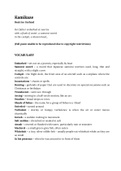Kamikaze
Beatrice Garland
Her father embarked at sunrise
with a flask of water, a samurai sword
in the cockpit, a shaven head...
(Full poem unable to be reproduced due to copyright restrictions)
VOCABULARY
Embarked - set out on a journey, especially by boat
Samurai sword - a sword that Japanese samurai warriors used, long, thin and
straight, with a slight curve
Cockpit - the flight deck, the front area of an aircraft such as a airplane where the
controls are
Incantations - chants or spells
Bunting - garlands of paper that are used to decorate on special occasions such as
Christmas or birthdays
Translucent - semi see-through
Arcing - moving in a half-circle motion, like an arc
Swathes - broad strips or rows
Shoals of fishes - the name for a group of fishes is a ‘shoal’
Swiveled - turned around
Turbulent - stormy or bumpy, turbulence is when the air or water moves
chaotically
Inrush - a sudden rushing in movement
Salt-sodden - drenched or soaked in salt
Awash - covered or flooded with water, particularly rain or seawater
Mackerel - a small green-grey fish, often eaten
Whitebait - a tiny, silver edible fish - usually people eat whitebait whole as they are
so small
In his presence - when he was around or in front of them
, STORY/SUMMARY
Stanza 1: Her father set off at dawn with a flask of water, a samurai sword in the
cockpit of his plane, his head had been shaven and it was full of powerful chants
and prayers, he had enough fuel for a one-way journey, he was supposed to take
part in a powerful moment in history.
Stanza 2: But halfway there (the woman thought, as she told the story later to her
children) he must have looked far down below from the plane that he was flying, at
the little fishing boats that were strung out like bunting on a green-blue
see-through sea.
Stanza 3: And beneath the boats, arcing in broad rows like a huge flag that is waved
first one way, then the other, in a figure of eight movement, the father must have
seen the dark shoals of fishes flashing silver as their bellies turned upwards towards
the sun (a premonition of bombing the water, as when fish die they rise to the
surface with their bellies turned up).
Stanza 4: And the father must have remembered how he and his fellow siblings that
were still waiting on the shore built towers (cairns) of pearl-grey pebbles to see
whose tower could last out the longest against the strong, chaotic tide that was
coming in, the same tide that brought in their father’s boat safely to shore.
Stanza 5: (the voice of the children listening to the story: yes, grandfather’s boat)
safely to the shore, covered in salt, flooded with the fish and seafood that he had
caught that day: cloud-marked mackerel, black crabs, feathery prawns, the loose
silver of whitebait and once he brought back a tuna fish, the dark prince, muscular
and dangerous.
Stanza 6: And though he returned from the war, my mother never spoke again in
front of him, nor did she look him in the eyes, and the neighbours too treated him
as though he no longer existed, only us children still chattered and laughed.
Stanza 7: Until gradually we also learned, as the adults did, to be silent around our
grandfather, to live as though he had never returned, that this was no longer the
father we loved. And sometimes, the mother said, he must have wondered whether





